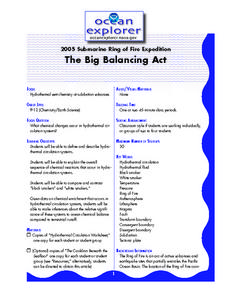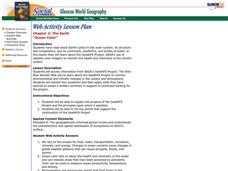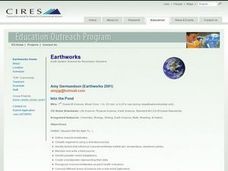Curated OER
Cold Fusion?
High schoolers apply their knowledge of relativity and nuclear radiation to the concept of cold fusion. They also read the article from the website listed in the related and resource websites and discuss the article with the class.
Curated OER
DRY UP BABY ! ANHYDROBIOSIS (freeze drying)
In this lab, students explore how organisms are able to survive the extreme environmental conditions found in the Polar regions. Students observe and draw active living rotifers and Tardigrades, design and perform experiments to collect...
Curated OER
FILLING IN THE GAPS - Acquiring and Analyzing Satellite and Ground-Based Data
Students monitor rainfall, compute daily averages, and compare their methods of computation to those used by actual researchers using satellite observations.
Curated OER
The Big Balancing Act
Students describe chemical changes occurring in hydrothermal circulation systems. They make inferences about the significance of these systems to ocean chemical balance compared to terrestrial runoff.
Curated OER
Meteorology
Seventh graders examine the job of meteorologists. They decide which characteristics of the atmosphere that meteorologists focus on. They use local weather maps from newspapers to predict weather in their area.
Curated OER
Ocean Color
Students examine NASA's SeaWiFS Project Web site to explore how the SeaWiFS Project monitors environmental and climatic changes in the oceans and atmosphere. They answer questions and write a summary in support of continued funding for...
Curated OER
Frozen Film
Students are introduced to the topic of light interference through this hands-on activity. They observe how light reflects off two surfaces and then meets to form an interesting variation of color on a film surface.
Curated OER
It Looks Like Champagne
Students determine some practical implications of the discovery of liquid carbon dioxide in deep-ocean ecosystems. They interpret phase diagrams and explain the meaning of "critical point" and "triple point."
Curated OER
Weather Predictions
Fourth graders explore meteorologists. They explore symbols on a weather map and make five day forecasts.
Curated OER
Severe Weather Planning
Fourth graders research the need to prepared for a severe weather event. They select one type of weather condition and explain how to be prepared in a report.
Curated OER
Build A Model of the Water Cycle
Students identify and describe the steps in the water cycle. They discover the sun as the source of the cycle. They work together to create their own water cycle model.
Curated OER
Environment
Students examine the energy saving benefits of trees. They identify ways in which trees reduce air pollution. They also work together to solve problems related to pollution.
Curated OER
Science: The Water Cycle
Learners examine the various stages of the water cycle. In groups, they complete a hands-on activity by creating model water cycle. Students design posters representing each of the seven stages of the water cycle.
Curated OER
Science: What Happens to Create the Lode?
Students understand how mineral deposits are formed and why they are not evenly dispersed. They create and describe three different precipitates from four solutions simulating mineral ore deposit formation in sedimentary rock.
Curated OER
Water & Ice
Students investigate the properties of water. In this states of water lesson, students explore how water goes from liquid to solid and back to liquid again. Students use measurement, observation, and communication to describe the change.
Curated OER
Weather Myths
Fourth graders relate myths to weather phenomenon. They write and illustrated a weather myth and present it to the class.
Curated OER
Is Air a Fluid?
Students discuss the physical properties of fluids and then demonstrate that air carbon dioxide and oxygen) is a fluid by creating currents.
Curated OER
Into the Pond
Seventh graders use a pond to explore macroinvertebrates and other organisms. They use a dichotomous key to classify the organisms and maintain a journal recording their findings.
Curated OER
Will It Rain Today or Tomorrow?
Students examine how to forecast weather. They examine the different types of weather and learn the correct vocabulary.
Curated OER
Air Pressure
Fourth graders observe a demonstration experiment showing air pressure. They explain air pressure by completing the worksheet.
Curated OER
Changes Close To Home
Middle schoolers interview the senior citizens in their community. While interviewing them, they identify perceptions they have about the local climate. Using the internet, the compare the results of the interview to those of public...
Curated OER
The Inside Current
Eighth graders explore ocean currents and wind patterns. They discover the concept of systems to show how change in one component of a body of water, causes change in other components in that system. Students describe positive and...
Curated OER
Life's Big Questions: Where Did Life Come From?
Students explore the life forms that live in the hot springs of Yellowstone. They examine how microscopic creatures can survive in these extreme conditions. Students perform experiments to observe growth samples and demonstrate how a...
Curated OER
Global Change — Change and Cycles Where Land, Air and Water Meet
Pupils participate in an experiment to define a parts-per-billion solution. In this ecology lesson, students select a second substance to create a parts-per-billion solution and observe and record their results. Pupils work in groups to...




